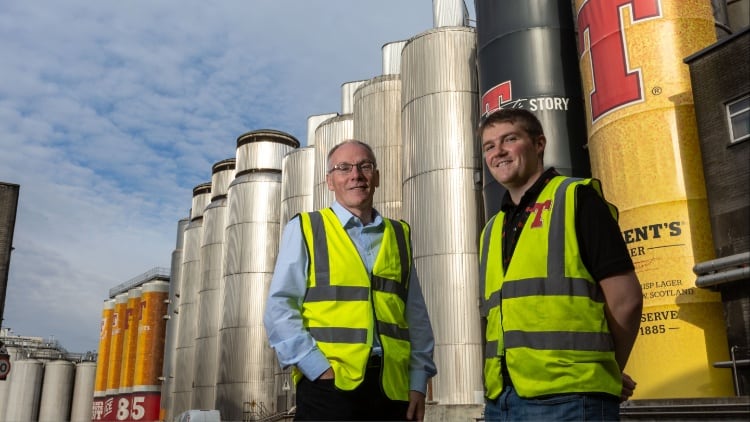Zero Waste Scotland’s Circular Economy Business Support service, along with the Tennent’s team, conducted a circular economy assessment, with findings shaping the brewer’s circular approach moving forward and providing management with reassurance that it was moving in the right direction with its practices.
Tennent’s is one of the oldest breweries in Scotland and in 2023 won a Vision in Business Scotland Award as the Best Large Business. Its Wellpark brewery site in Glasgow is powered by 100% renewable electricity and is now self-sufficient with its carbon capture capability.
The beer maker is committed to using Scottish barley and fresh highland water from Loch Katrine and uses solar-assisted delivery vans to ship kegs to pubs across Scotland to avoid air miles. Tennent’s recent switch to lightweight cans has reduced the heat requirements in production and lowered the transportation cost, while the brewer has pledged to offset the carbon emissions of every shipment by purchasing the equivalent road miles in carbon credits when customers shop from its website directly.
Commenting on Tennent’s commitment to circular economy principles, head of engineering and technical Martin Doogan said that the team is “continuously reviewing” its practices, while also anticipating what the future of brewing should look like.
“Zero Waste Scotland’s CEBS service helped us look at new opportunities and ideas that we could implement in 15 years’ time,” Doogan continued.
“We’ve looked at our supply chain, talked to our suppliers and customers to look at ways we can reduce the environmental impact we have on our planet. Tennent’s was the first brewer to join the UK Plastic Pact and has removed single use plastic from the packaging of canned products by offering a cardboard alternative, taking 150 tonnes of plastic out of circulation.
“Kegs that are shipped out daily to customers are reused and recovered, recleaned and refilled with Tennent’s product, keeping circularity at the core.”
Environmental engineer at the Wellpark site Thomas McIvor added: “The fermentation process when making lager produces a by-product of CO2, which we take, capture, treat and store for carbonating the beer at the end of the product line. This allows us to be 95% self-sufficient in CO2, and we’ve successfully removed about 4,000 tonnes of CO2 from the atmosphere every year.
“A couple of years ago we installed an on-site anaerobic digestion plant which treats all the wastewater from the brewery. This cleans up the wastewater, and as a by-product of this treatment, biogas is produced. We store and use on-site for our biomass boiler that heats 8% of our heat demand and removes excess natural gas for on-site heating and the carbon associated with this.”
Manufacturing embraces circular economy
According to a recent study conducted by waste management company Biffa, 74% of manufacturing firms view the circular economy as important. On behalf of Biffa, YouGov’s analysis institute surveyed more than 1,000 UK decision makers about their engagement with the circular economy and its principles, and found that 69% of manufacturers participate in the circular economy, while 78% have adopted a sustainable strategy.
Elsewhere, 79% of manufacturing decision makers surveyed recognise the vital role that waste management and recycling play in preventing climate change.
Commenting on the support for circular economy principles within the manufacturing sector, Biffa chartered resource waste manager Iain Hollington said: “We’re encouraged to see a critical UK industry with such a comprehensive grasp of the significance of the circular economy, and how sustainable waste management enables the circular economy.
“Conscious decisions made in the manufacturing process have an enormous impact on the reusability and recoverability of materials introduced to the UK market, in line with policy asks and carbon hierarchy adoption recommended in our Blueprint for Waste Net Zero.
"This can significantly drive the circular economy, reduce costs, provide more recycled materials, and stimulate further growth – all key advantages as the sector rebalances following the 2020 pandemic.”
In other news, more than 1m children in the UK are at risk of their development being impacted because they lack nutrients such as calcium and vitamin D, according to Yoplait.




